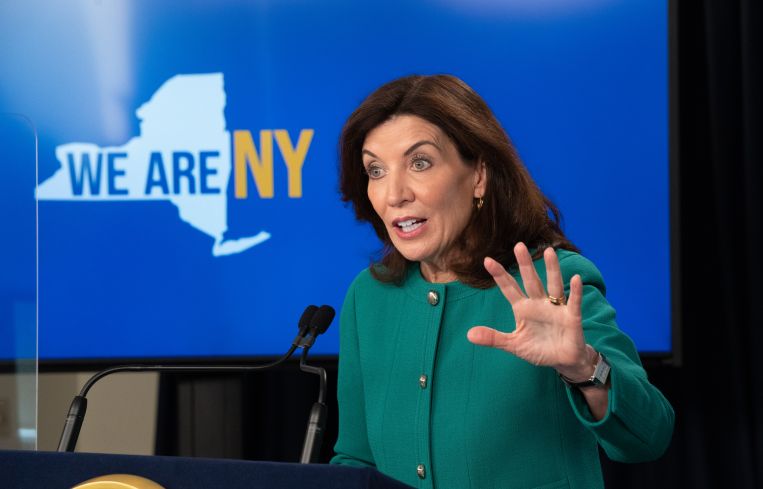Before Its Approval, Hochul Disarms Law to Unmask LLCs
By Mark Hallum December 26, 2023 12:37 pm
reprints
New York Gov. Kathy Hochul signed a law to provide more transparency to limited liability companies in New York, but some critics say the law’s final iteration fritters away the opportunity for real accountability.
The lawmakers who originally pitched the LLC Transparency Act seem to be accepting the concessions made by the executive chamber. At least for now.
Now dubbed the LLC Disclosure Act, the bill requires beneficial owners of properties in New York state to provide their real names for a New York Department of State (DOS) database accessible only to law enforcement. However, Hochul’s office cut out the requirement to make the list available to the public at large.
“Wage theft, money laundering, tenant mistreatment and other unlawful activity has been masked by the opaque ownership structure of an LLC,” Hochul said in a statement Dec. 22, when she signed the bill into law. “The new LLC Transparency Act will give law enforcement and state regulators the tools they need to hold bad actors accountable.”
There will also be a new authority to prosecute owners who ignore the law — oftentimes slumlords and money launderers parking cash in Manhattan real estate — which still comes with a paltry $250 civil penalty for landlords who don’t comply with the law within two years.
Assembly member Emily Gallagher and State Sen. Brad Hoylman-Sigal — who introduced the original legislation — issued a joint statement describing the bill as something that achieves at least two of their original objectives: bringing attention to the issues that shell corporations present to tenants and law enforcement, and giving government agencies access to names.
“Unfortunately, this law does not create the publicly available database that we fought for and that the legislature passed with significant majorities,” the joint statement said. “Disclosure to state and local governments is an important first step but it is not transparency. Tenants deserve to know who they pay rent to, and employees should know who owns the companies mistreating them. That fight is not over.”
Watchdog group Reinvent Albany believes that Hochul has “squandered” the opportunity to hold bad actors accountable by making it impossible for the public, including the press, to look into matters for themselves and bring unlawful business practices to the attention of the law.
“Unfortunately, Gov. Hochul used a ‘chapter amendment’ to strip out the public database at the heart of the LLC Transparency Act … and the Legislature acquiesced,” the organization said in a statement. “Real-life government investigators in New York do not have much in the way of advanced computer analytics automatically detecting and flagging money laundering and misbehaving shell companies. … The LLC ownership database created by the governor and legislature will be secret, and watchdogs and journalists will have zero idea if it is a big success or total failure.”
Hochul’s concessions can be seen as a win for some in the real estate community who have previously argued that it was redundant and tedious.
“The agreement reached by the Governor and State Legislature largely replicates the approach taken by the federal government – requiring certain LLCs to confidentially disclose ownership information to regulators and law enforcement officials,” the Real Estate Board of New York said in a statement. “This thoughtful and balanced approach addresses the need to ensure LLCs can’t be used for illegal purposes without infringing on privacy rights or raising identity theft risks.”
Jeffrey Margolis of The Margolis Law Firm previously said that since the measure targeted only LLCs, individual owners will still hide behind other forms of registration.
And Hochul’s removal of the public database may not be viewed as a failure to those representing the industry’s best interests who argued for exactly what the government gave them and their clients: privacy.
Celebrities and victims of domestic violence would likely be vulnerable to stalkers and others with personal grievances if the database was made publicly available, real estate attorney Adam Leitman Bailey told Commercial Observer in July.
“[The legislation] does not apply to S corporations, which gives another outlet to persons starting a business and wanting to bypass the LLC Transparency Act,” Bailey told CO in an email Wednesday.
It was especially viewed as redundant over the summer when there is a similar law at the federal level, the Corporate Transparency Act, which doesn’t only apply to LLCs but to all corporate entities. The federal law also does not make names publicly available, making the state law possibly even less impactful in some eyes.
Mark Hallum can be reached at mhallum@commercialobserver.com.



